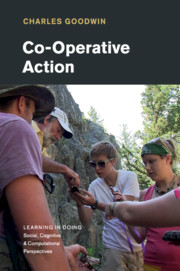Book contents
- Co-Operative Action
- Learning in Doing: Social, Cognitive and Computational Perspectives
- Co-Operative Action
- Copyright page
- Dedication
- Contents
- Figures
- Acknowledgments
- 1 What Is Co-Operative Action, and Why Is It Important?
- Part I Co-Operative Accumulative Action
- Part II Intertwined Semiosis
- Part III Embodied Interaction
- Part IV Co-Operative Action with Predecessors
- Part V Professional Vision, Transforming Sensory Experience into Types, and the Creation of Competent Inhabitants
- References Cited
- Index
- Series page
Part IV - Co-Operative Action with Predecessors
Sedimented Landscapes for Knowledge and Action
Published online by Cambridge University Press: 03 November 2017
- Co-Operative Action
- Learning in Doing: Social, Cognitive and Computational Perspectives
- Co-Operative Action
- Copyright page
- Dedication
- Contents
- Figures
- Acknowledgments
- 1 What Is Co-Operative Action, and Why Is It Important?
- Part I Co-Operative Accumulative Action
- Part II Intertwined Semiosis
- Part III Embodied Interaction
- Part IV Co-Operative Action with Predecessors
- Part V Professional Vision, Transforming Sensory Experience into Types, and the Creation of Competent Inhabitants
- References Cited
- Index
- Series page
Summary
Co-operative action is not restricted to states of copresence. As noted by phenomenologists, we find ourselves surrounded by objects that embody resources and solutions created by earlier actors who are no longer present. Though lacking the unique attributes of what Goffman called mutual monitoring, and Schutz the We-Relationship, these materials, which include sedimented architectures for perception, are made relevant to current tasks through accumulative co-operative transformations. An airport worker charged with monitoring the readiness of aircraft for on-time departure uses a vernacular document created by her predecessors, a schedule, as an environmental lamination to transform the airplanes she sees into time-saturated work-relevant objects with destinations and departure times. When a mechanical problem is seen she can note it with a concise abbreviation on the appropriate row of the schedule. Such accumulative reuse with transformation of the flight information inherited from her predecessors is formally the same as the transformative reuse of language structure created by prior speakers examined in earlier chapters.
* * *
- Type
- Chapter
- Information
- Co-Operative Action , pp. 243 - 324Publisher: Cambridge University PressPrint publication year: 2017

